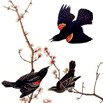Center, Internet, Wildlife Damage Management

Bird Control Seminars Proceedings
Document Type
Article
Date of this Version
10-1983
Citation
Proceedings Ninth Bird Control Seminar, Bowling Green State University, Bowling Green, Ohio, October 4-6, 1983. Ed. William B. Jackson and Beth Jackson Dodd
Abstract
Although the European starling (Sturnus vulgaris) has long been considered a serious depredator of certain crops, especially fruit, it has not been thought to seriously damage maturing corn. In fact, most investigators have considered starlings to be beneficial in cornfields because of their consumption of earworms (Heliothus zea) and other insects. In controlled cage studies we determined starlings were capable of causing substantial damage to maturing field corn. Starling damage to a long-husked resistant and to a short-husked susceptible hybrid was 1.6 and 2.7 times greater, respectively, than that caused by male red-winged blackbirds (Agelaius phoeniceus). The long- and short-husked hybrids suffered a mean loss of corn per ear of 3 and 45%, respectively, to starlings. These findings support recent field observations of starlings feeding on maturing field corn in Ontario, Canada. We conclude that starlings have the potential for becoming serious depredators of the loose or short-husked hybrids of corn that are becoming popular because of their drying qualities.


Comments
Copyright (c) 1983 Paul P. Woronecki and Richard A. Dolbeer